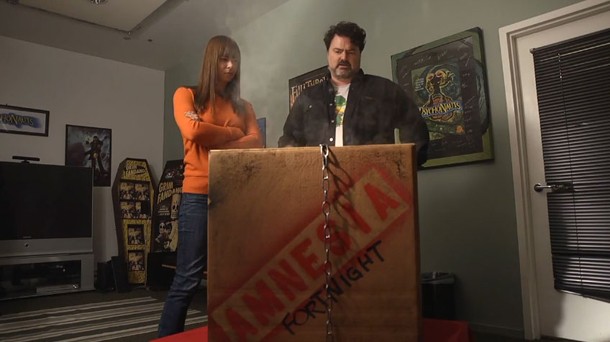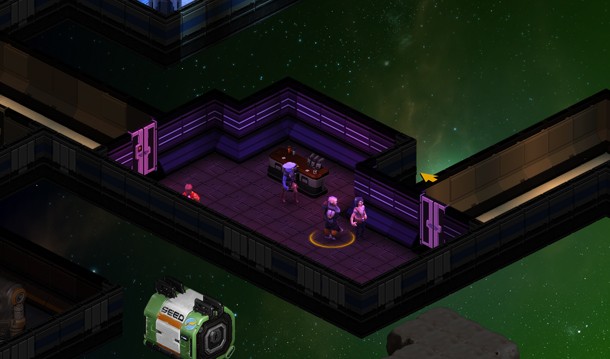Double Fine’s Divergent Development Model: The Birth Of Spacebase DF-9

Double Fine is a studio that values creativity above all else. This drive for originality is evidenced in the wildly different games the development team has created across a range of genres, exploring everything from the inner workings of the mind in Psychonauts to a world where Russian nesting dolls solve their problems by jumping inside of one another in Stacking. Tim Schafer often takes the spotlight for Double Fine’s work, but with the success of its Broken Age Kickstarter and the 2 Player Productions-produced documentary series covering the game’s development, the studio has opened its doors to the public to reveal how it comes up with its innovative ideas.
Periodically, Double Fine holds Amnesia Fortnight, a two-week event in which the studio shuts down production on all of its current projects to focus on creativity. Pitches for ideas are developed internally and chosen for prototyping, and small teams focus on the selected ideas, building as much of the game as possible in the short time frame. Small independent studios, and even larger companies like Valve, have run similar programs, but Double Fine is the first to do it with everyone watching. "We definitely didn't invent [this approach],” says Double Fine producer Greg Rice. “We've just embraced it very fully as part of our studio image publicly.”
Past Amnesia Fortnight campaigns have produced games like Costume Quest and Iron Brigade, but they were internal and secretive processes. In a humorous video announcing Amnesia Fortnight’s public campaign, the studio joked that it had no idea how projects deserving of Amnesia Fortnight’s focus were selected in the past. Ideas were pitched to studio head Tim Schafer, and he would pick the ones that seemed the most appropriate and divvy up the teams.
For 2012’s Amnesia Fortnight, Double Fine’s staff created 23 short pitch videos for their game ideas and posted them online. Double Fine then allowed fans to vote on their favorites, and the top five were selected for prototyping. All of this was framed around a “pay whatever you want” charitable Humble Bundle that gave access to all the completed prototypes, as well as a collection of documentary shorts covering the Amnesia Fortnight process.
Jean Paul LeBreton’s Spacebase DF-9 was one of the games selected for prototyping. The game has since progressed, and is now officially available in its alpha build for players to purchase online through Steam Early Access as it makes its way towards full release. "I felt probably more proud than I've felt of any other thing I've been involved with in game development – seeing everyone's ideas piling into this giant bananas basket," says LeBreton. He was surprised that his was picked. "It turns out saying sci-fi Dwarf Fortress turns a magical key in many a nerd brain, myself included," he says.
"Double Fine is trying to get more and more agile over time so we can adapt to the way the industry changes and work on things that we know people are going to be excited about.” – Jean Paul LeBreton
Turning around a completely original game prototype in two weeks can be a grueling, but invigorating process. "It was two weeks where my definition of normalcy, in terms of what I do for a living and what was happening in my life, was completely suspended," LeBreton says. The process was documented with videos posted online during the two-week process, allowing fans to offer feedback while the games were being built. “It almost felt like peer-critique,” LeBreton says, since those participating in the forums and watching the videos were seeing every development choice occur from the prototype’s inception. These weren’t the typical online message board participants interesting in complaining about choices made. They were there to offer their ideas toward what could make the games better. “I love that it demystifies it,” says LeBreton. “I personally really love that kind of involvement.”

"[Tim Schafer] cares a lot about the perception that Double Fine is a place where creative people are,” LeBreton says, which was a major incentive behind Amnesia Fortnight’s public campaign. It gave an unprecedented inside look at an atypical development process. "I came to Double Fine because I was extremely interested in this type of development," says LeBreton, who has a history working with studios like Irrational on games like BioShock. "Shorter projects with more transparency and alternative funding – I think it's a way to make more interesting games in this day and age."









